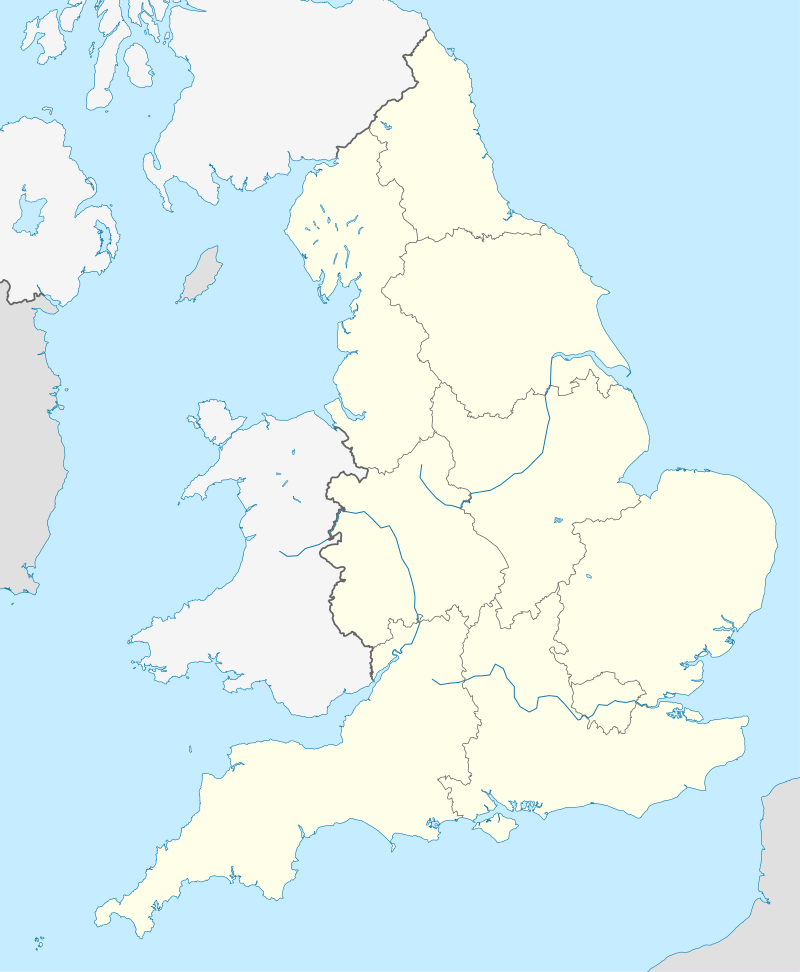1966 FIFA World Cup
The 1966 FIFA World Cup was a tournament, which was played in England between 11 and 30 July 1966 to find the football world champion. It was the eighth FIFA World Cup, the first having been played in 1930. England defeated West Germany 4–2 in the final to win their first (and only) World Cup; the match had finished at 2–2 after 90 minutes and went to extra time, when Geoff Hurst scored two goals to complete his hat-trick, the first and as of 2018 only to be scored in a World Cup final, with spectators storming the pitch during the fourth goal. England were the fifth nation to win the event, and the third host nation to win after Uruguay in 1930 and Italy in 1934. Brazil were the defending champions, but they failed to progress from the group stage.
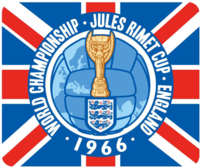 1966 FIFA World Cup official logo | |
| Tournament details | |
|---|---|
| Host country | England |
| Dates | 11–30 July |
| Teams | 16 (from 4 confederations) |
| Venue(s) | 8 (in 7 host cities) |
| Final positions | |
| Champions | |
| Runners-up | |
| Third place | |
| Fourth place | |
| Tournament statistics | |
| Matches played | 32 |
| Goals scored | 89 (2.78 per match) |
| Attendance | 1,563,135 (48,848 per match) |
| Top scorer(s) | |
| Best young player | |
Two debut teams performed well at the competition – Portugal finished third, losing 2–1 to England in the semi-final, while North Korea beat Italy 1–0 on the way to reaching the quarter-finals, where they lost to Portugal 5–3. Portuguese striker Eusébio was the tournament's top scorer, with nine goals winning the golden boot. Eusébio scored three goals more than second placed Helmut Haller.
It was the first FIFA World Cup held in the English-speaking world. Matches were played at eight stadiums across England, with the final being held at Wembley Stadium, which had a capacity of 98,600. The 1966 event featured the highest number of teams of any international tournament to date, with 70 nations participating. Thirty-one African nations boycotted the World Cup, having objected to the number of guaranteed placings at the finals.
Prior to the tournament, the Jules Rimet trophy was stolen, but was recovered by a dog named Pickles four months before the tournament began. It was the first World Cup to have selected matches broadcast via satellite to countries on other continents.[1] The final, which was broadcast locally by the BBC, was the last to be shown entirely in black and white.
Background
England was chosen as host of the 1966 World Cup in Rome, Italy on 22 August 1960, over rival bids from West Germany and Spain. This is the first tournament to be held in a country that was affected directly by World War II, as the four previous tournaments were either held in countries out of war theatres or in neutral countries.[2][3]
Qualification
Despite the Africans' absence, there was another new record number of entries for the qualifying tournament, with 70 nations taking part. After all the arguments, FIFA finally ruled that ten teams from Europe would qualify, along with four from South America, one from Asia and one from North and Central America.[4]
Portugal and North Korea qualified for the first time. Portugal would not qualify again until 1986, while North Korea's next appearance was at the 2010 tournament. This was also Switzerland's last World Cup finals until 1994. Notable absentees from this tournament included 1962 semi-finalists Yugoslavia and 1962 runners-up Czechoslovakia.[4][5]
Qualified teams
The following 16 teams qualified for the final tournament.[4]
|
AFC (1) CAF (0)
OFC (0)
|
CONCACAF (1) CONMEBOL (4)
|
UEFA (10)
|
Qualification for 1966 FIFA World Cup 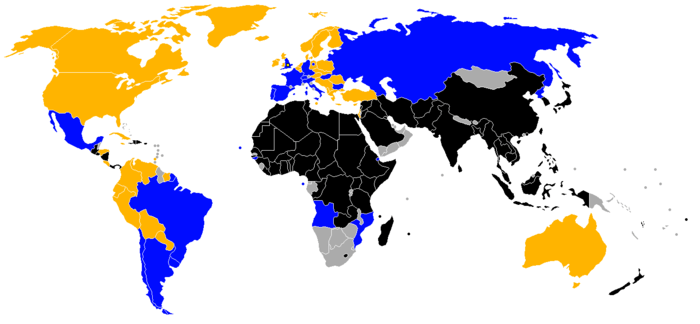 FIFA members qualified for World Cup (including colonies) FIFA members that failed to qualify FIFA members that did not enter World Cup
Countries not members of FIFA in 1966
|
Controversies
African boycott
Thirty-one African nations boycotted the tournament to protest a 1964 FIFA ruling that required the three second-round winners from the African zone to enter a play-off round against the winners of the Asian zone in order to qualify for the World Cup, as they felt winning their zone was enough in itself to merit qualification. They also protested against the readmission of South Africa to FIFA in 1963, despite its expulsion from CAF due to the apartheid regime in 1958.[6][7]
South Africa was subsequently assigned to the Asia and Oceania qualifying group before being disqualified after being suspended again due to pressure from other African nations in October 1964.[8] Despite this, after FIFA refused to change the qualifying format, the African teams decided anyway to pull out of the World Cup until at least one African team had a place assured in the World Cup, something which was put in place for the 1970 FIFA World Cup and all subsequent World Cup finals.[6] The Portuguese colonies of Angola and Mozambique participated for Portugal.[6][8]
Trophy incident and mascot
The 1966 World Cup had a rather unusual hero off the field, a dog called Pickles.[9] In the build-up to the tournament, the Jules Rimet trophy was stolen from an exhibition display. A nationwide hunt for the icon ensued. It was later discovered wrapped in newspaper as the dog sniffed under some bushes in London.[10] The FA commissioned a replica cup in case the original cup was not found in time. This replica, as well as Pickles' collar, is held at the National Football Museum in Manchester, where it is on display.[11]
World Cup Willie was the mascot for the 1966 competition. This was the first World Cup mascot, and one of the first mascots to be associated with a major sporting competition.[12] World Cup Willie is a lion, a typical symbol of the United Kingdom, wearing a Union Flag jersey emblazoned with the words "WORLD CUP". Willie was designed by freelance children's book illustrator Reg Hoye.[13][14]
Format
The format of the 1966 competition remained the same as 1962: 16 qualified teams were divided into four groups of four. Each group played a round-robin format.[15] Two points were awarded for a win and one point for a draw, with goal average used to separate teams equal on points.[15] The top two teams in each group advanced to the knockout stage.[15]
In the knockout games, if the teams were tied after 90 minutes, 30 minutes of extra time were played. For any match other than the final, if the teams were still tied after extra time, lots would be drawn to determine the winner. The final would have been replayed if tied after extra time. In the event, no replays or drawing of lots was necessary.
The draw for the final tournament, taking place on 6 January 1966 at the Royal Garden Hotel in London was the first ever to be televised, with England, West Germany, Brazil and Italy as seeds.[16]
Venues
Eight venues were used for this World Cup. The newest and biggest venue used was Wembley Stadium in north London, which was 43 years old in 1966. As was often the case in the World Cup, group matches were played in two venues in close proximity to each other. Group 1 matches (which included the hosts) were all played in London: five at Wembley, which was England's national stadium and was considered to be the most important football venue in the world; and one at White City Stadium in west London, which was used as a temporary replacement for nearby Wembley. The group stage match between Uruguay and France played at White City Stadium (originally built for the 1908 Summer Olympics) was scheduled for a Friday, the same day as regularly scheduled greyhound racing at Wembley. Because Wembley's owner refused to cancel this, the game had to be moved to the alternative venue in London. Group 2's matches were played at Hillsborough Stadium in Sheffield and Villa Park in Birmingham; Group 3's matches were played at Old Trafford in Manchester and Goodison Park in Liverpool; and Group 4's matches were played at Ayresome Park in Middlesbrough and Roker Park in Sunderland.
The most used venue was Wembley, which was used for nine matches, including all six featuring England, the final and the third-place match. Goodison Park was used for five matches, Roker Park and Hillsborough both hosted four, while Old Trafford, Villa Park and Ayresome Park each hosted three matches and did not host any knockout round matches.
| London | London | |
|---|---|---|
| Wembley Stadium | White City Stadium | |
| Capacity: 98,600 | Capacity: 76,567 | |
.jpg) |
 | |
| Manchester | Birmingham | |
| Old Trafford | Villa Park | |
| Capacity: 58,000 | Capacity: 52,000 | |
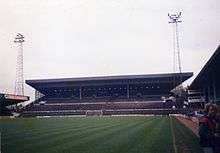 | ||
| Liverpool | Sheffield | |
| Goodison Park | Hillsborough Stadium | |
| Capacity: 50,151 | Capacity: 42,730 | |
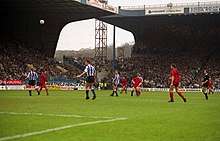 | ||
| Sunderland | Middlesbrough | |
| Roker Park | Ayresome Park | |
| Capacity: 40,310 | Capacity: 40,000 | |
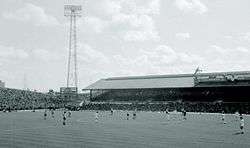 |
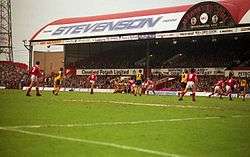 |
Tournament summary
The opening match took place on Monday 11 July. With the exception of the first tournament, which commenced on 13 July 1930, every other tournament (up to and including 2018) has commenced in May or June. The final took place on 30 July 1966, the 36th anniversary of the first final. This remains the latest date that any tournament has concluded. The reason for the unusually late scheduling of the tournament appears to lie with the outside broadcast commitments of the BBC, which also had commitments to cover Wimbledon (which ran between 20 June and 2 July) and the Open Golf Championship (6 to 9 July).
Group-stage
1966 was a World Cup with few goals as the teams began to play much more tactically and defensively. This was exemplified by Alf Ramsey's England as they finished top of Group 1 with only four goals, but having none scored against them. They also became the first World Cup winning team not to win its first game in the tournament. Uruguay were the other team to qualify from that group at the expense of both Mexico and France. All the group's matches were played at Wembley Stadium apart from the match between Uruguay and France which took place at White City Stadium.
In Group 2, West Germany and Argentina qualified with ease as they both finished the group with 5 points, Spain managed 2, while Switzerland left the competition after losing all three group matches. FIFA cautioned Argentina for its violent style in the group games, particularly in the scoreless draw with West Germany, which saw Argentinean Rafael Albrecht get sent off and suspended for the next match.[17][18]
In the northwest of England, Old Trafford and Goodison Park played host to Group 3 which saw the two-time defending champions Brazil finish in third place behind Portugal and Hungary, and be eliminated along with Bulgaria. Brazil were defeated 3–1 by Hungary in a classic encounter before falling by the same scoreline to Portugal in a controversial game. Portugal appeared in the finals for the first time, and made quite an impact. They won all three of their games in the group stage, with a lot of help from their outstanding striker Eusébio, whose nine goals made him the tournament's top scorer.
Group 4, however, provided the biggest upset when North Korea beat Italy 1–0 at Ayresome Park, Middlesbrough and finished above them, thus earning qualification to the next round along with the Soviet Union. This was the first time that a nation from outside Europe or the Americas had progressed from the first stage of a World Cup: the next would be Morocco in 1986.
Knock-out stages
The quarter-finals provided a controversial victory for West Germany as they cruised past Uruguay 4–0; the South Americans claimed that this occurred only after the referee (who was Jim Finney, from England) had not recognised a handball by Schnellinger on the goal line and then had sent off two players from Uruguay: Horacio Troche and Héctor Silva.[19] It appeared as though the surprise package North Korea would claim another major upset in their match against Portugal at Goodison Park, when after 22 minutes they led 3–0. It fell to one of the greatest stars of the tournament, Eusébio, to change that. He scored four goals in the game and José Augusto added a fifth in the 78th minute to earn Portugal a 5–3 win.
Meanwhile, in the other two games, Ferenc Bene's late goal for Hungary against the Soviet Union, who were led by Lev Yashin's stellar goalkeeping, proved little more than a consolation as they crashed out 2–1, and the only goal between Argentina and England came courtesy of England's Geoff Hurst. During that controversial game (for more details see Argentina and England football rivalry), Argentina's Antonio Rattín became the first player to be sent off in a senior international football match at Wembley.[20] Rattín at first refused to leave the field and eventually had to be escorted by several policemen. After 30 minutes England scored the only goal of the match. This game is called el robo del siglo (the robbery of the century) in Argentina.[21]
All semi-finalists were from Europe. The venue of the first semi-final between England and Portugal was changed from Goodison Park in Liverpool to Wembley, due to Wembley's larger capacity. This larger capacity was particularly significant during a time when ticket revenue was of crucial importance.[22] Bobby Charlton scored both goals in England's win, with Portugal's goal coming from a penalty in the 82nd minute after a handball by Jack Charlton on the goal line.[23][24] The other semi-final also finished 2–1: Franz Beckenbauer scoring the winning goal with a left foot shot from the edge of the area for West Germany as they beat the Soviet Union.[25]
Portugal went on to beat the Soviet Union 2–1 to take third place. Portugal's third place was the best finish by a team making its World Cup debut since 1934. It was equalled by Croatia in 1998.
Final
London's Wembley Stadium was the venue for the final, and 98,000 people attended. After 12 minutes 32 seconds Helmut Haller put West Germany ahead, but the score was levelled by Geoff Hurst four minutes later. Martin Peters put England in the lead in the 78th minute; England looked set to claim the title when the referee awarded a free kick to West Germany with one minute left. The ball was launched goalward and Wolfgang Weber scored, with England appealing in vain for handball as the ball came through the crowded penalty area.[26]
.jpg)
With the score level at 2–2 at the end of 90 minutes, the game went to extra time. In the 98th minute, Hurst found himself on the scoresheet again; his shot hit the crossbar, bounced down onto the goal line, and was awarded as a goal. Debate has long raged over whether the ball crossed the line, with the goal becoming part of World Cup history.[27] England's final goal was scored by Hurst again, as a celebratory pitch invasion began. This made Geoff Hurst the only player ever to have scored three times in a single World Cup final.[26] BBC commentator Kenneth Wolstenholme's description of the match's closing moments has gone down in history: "Some people are on the pitch. They think it's all over ... [Hurst scores] It is now!".[28]
England's total of eleven goals scored in six games set a new record low for average goals per game scored by a World Cup winning team. The record stood until 1982, when it was surpassed by Italy's 12 goals in seven games; in 2010 this record was lowered again by Spain, winning the Cup with eight goals in seven games. England's total of three goals conceded also constituted a record low for average goals per game conceded by a World Cup winning team. That record stood until 1994, when it was surpassed by Brazil's three goals in seven games. France again lowered the record to two goals in seven during the 1998 tournament, a record that has since been equalled by Italy at the 2006 tournament and by Spain's two goals in the group stage conceded during the 2010 tournament.
England received the recovered Jules Rimet trophy from Elizabeth II and were crowned World Cup winners for the first time.[26]
In this World Cup, the national anthems were played only in the final. They were not played in the earlier matches because the organisers (FIFA and the FA) feared that North Korea's presence – a socialist country that was not recognised by the United Kingdom – in the World Cup would cause problems with South Korea. A memo from the Foreign Office months before the finals began stated that the solution would be "denying the visas to North Korean players".[29] The final, held at Wembley Stadium, was the last to be broadcast in black and white.[30]
Match officials
A total of 26 match referees and other officials featured at the event. Despite the event being a worldwide tournament, the majority of the officials were from Europe. Gottfried Dienst refereed the final between England and West Germany.[31]
- Africa
- Asia
- South America


.svg.png)
.svg.png)
- Europe
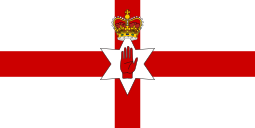

.svg.png)





.svg.png)




.svg.png)
.svg.png)
.svg.png)

.svg.png)

Draw
| Pot 1: South American | Pot 2: European | Pot 3: Latin European | Pot 4: Rest of the World |
|---|---|---|---|
|
Squads
Group stage
Group 1
| Pos | Team | Pld | W | D | L | GF | GA | GR | Pts | Qualification |
|---|---|---|---|---|---|---|---|---|---|---|
| 1 | 3 | 2 | 1 | 0 | 4 | 0 | — | 5 | Advance to knockout stage | |
| 2 | 3 | 1 | 2 | 0 | 2 | 1 | 2.000 | 4 | ||
| 3 | 3 | 0 | 2 | 1 | 1 | 3 | 0.333 | 2 | ||
| 4 | 3 | 0 | 1 | 2 | 2 | 5 | 0.400 | 1 |
| England | 2–0 | |
|---|---|---|
| B. Charlton Hunt |
Report |
Group 2
| Pos | Team | Pld | W | D | L | GF | GA | GR | Pts | Qualification |
|---|---|---|---|---|---|---|---|---|---|---|
| 1 | 3 | 2 | 1 | 0 | 7 | 1 | 7.000 | 5 | Advance to knockout stage | |
| 2 | 3 | 2 | 1 | 0 | 4 | 1 | 4.000 | 5 | ||
| 3 | 3 | 1 | 0 | 2 | 4 | 5 | 0.800 | 2 | ||
| 4 | 3 | 0 | 0 | 3 | 1 | 9 | 0.111 | 0 |
- West Germany were placed first due to superior goal average.
| West Germany | 5–0 | |
|---|---|---|
| Held Haller Beckenbauer |
Report |
| Spain | 2–1 | |
|---|---|---|
| Sanchís Amancio |
Report | Quentin |
| Argentina | 2–0 | |
|---|---|---|
| Artime Onega |
Report |
Group 3
| Pos | Team | Pld | W | D | L | GF | GA | GR | Pts | Qualification |
|---|---|---|---|---|---|---|---|---|---|---|
| 1 | 3 | 3 | 0 | 0 | 9 | 2 | 4.500 | 6 | Advance to knockout stage | |
| 2 | 3 | 2 | 0 | 1 | 7 | 5 | 1.400 | 4 | ||
| 3 | 3 | 1 | 0 | 2 | 4 | 6 | 0.667 | 2 | ||
| 4 | 3 | 0 | 0 | 3 | 1 | 8 | 0.125 | 0 |
Group 4
| Pos | Team | Pld | W | D | L | GF | GA | GR | Pts | Qualification |
|---|---|---|---|---|---|---|---|---|---|---|
| 1 | 3 | 3 | 0 | 0 | 6 | 1 | 6.000 | 6 | Advance to knockout stage | |
| 2 | 3 | 1 | 1 | 1 | 2 | 4 | 0.500 | 3 | ||
| 3 | 3 | 1 | 0 | 2 | 2 | 2 | 1.000 | 2 | ||
| 4 | 3 | 0 | 1 | 2 | 2 | 5 | 0.400 | 1 |
| Soviet Union | 3–0 | |
|---|---|---|
| Malofeyev Banishevskiy |
Report |
| Chile | 1–1 | |
|---|---|---|
| Marcos |
Report | Pak Seung-zin |
| Soviet Union | 1–0 | |
|---|---|---|
| Chislenko |
Report |
| North Korea | 1–0 | |
|---|---|---|
| Pak Doo-ik |
Report |
| Soviet Union | 2–1 | |
|---|---|---|
| Porkuyan |
Report | Marcos |
Knockout stage
Bracket
| Quarter-finals | Semi-finals | Final | ||||||||
| 23 July – London (Wembley) | ||||||||||
| 1 | ||||||||||
| 26 July – London (Wembley) | ||||||||||
| 0 | ||||||||||
| 2 | ||||||||||
| 23 July – Liverpool | ||||||||||
| 1 | ||||||||||
| 5 | ||||||||||
| 30 July – London (Wembley) | ||||||||||
| 3 | ||||||||||
| 4 | ||||||||||
| 23 July – Sheffield | ||||||||||
| 2 | ||||||||||
| 4 | ||||||||||
| 25 July – Liverpool | ||||||||||
| 0 | ||||||||||
| 2 | ||||||||||
| 23 July – Sunderland | ||||||||||
| 1 | Third place | |||||||||
| 2 | ||||||||||
| 28 July – London (Wembley) | ||||||||||
| 1 | ||||||||||
| 2 | ||||||||||
| 1 | ||||||||||
Quarter-finals
| West Germany | 4–0 | |
|---|---|---|
| Haller Beckenbauer Seeler |
Report |
| Portugal | 5–3 | |
|---|---|---|
| Eusébio José Augusto |
Report | Pak Seung-zin Li Dong-woon Yang Seung-kook |
Semi-finals
| West Germany | 2–1 | |
|---|---|---|
| Haller Beckenbauer |
Report | Porkuyan |
Final
| England | 4–2 (a.e.t.) | |
|---|---|---|
| Report |
Goalscorers
With nine goals, Eusébio was the top scorer in the tournament. In total, 89 goals were scored by 47 players, with two of them credited as own goals.[32]
- 9 goals
- 6 goals
- 4 goals
- 3 goals
|
|
|
|
- 2 goals
- 1 goal
- 1 own goal
|
All-star team
| Goalkeeper | Defenders | Midfielders | Forwards |
|---|---|---|---|
Source:[33] | |||
Final standings
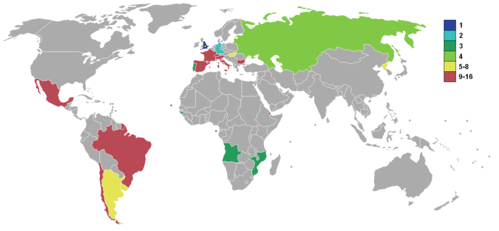
Angola and Mozambique represented Portugal.
In 1986, FIFA published a report that ranked all teams in each World Cup up to and including 1986, based on progress in the competition, overall results and quality of the opposition.[34][35] The rankings for the 1966 tournament were as follows:
| R | Team | G | P | W | D | L | GF | GA | GD | Pts. |
|---|---|---|---|---|---|---|---|---|---|---|
| 1 | 1 | 6 | 5 | 1 | 0 | 11 | 3 | +8 | 11 | |
| 2 | 2 | 6 | 4 | 1 | 1 | 15 | 6 | +9 | 9 | |
| 3 | 3 | 6 | 5 | 0 | 1 | 17 | 8 | +9 | 10 | |
| 4 | 4 | 6 | 4 | 0 | 2 | 10 | 6 | +4 | 8 | |
| Eliminated in the quarter-finals | ||||||||||
| 5 | 2 | 4 | 2 | 1 | 1 | 4 | 2 | +2 | 5 | |
| 6 | 3 | 4 | 2 | 0 | 2 | 8 | 7 | +1 | 4 | |
| 7 | 1 | 4 | 1 | 2 | 1 | 2 | 5 | −3 | 4 | |
| 8 | 4 | 4 | 1 | 1 | 2 | 5 | 9 | −4 | 3 | |
| Eliminated in the group stage | ||||||||||
| 9 | 4 | 3 | 1 | 0 | 2 | 2 | 2 | 0 | 2 | |
| 10 | 2 | 3 | 1 | 0 | 2 | 4 | 5 | −1 | 2 | |
| 11 | 3 | 3 | 1 | 0 | 2 | 4 | 6 | −2 | 2 | |
| 12 | 1 | 3 | 0 | 2 | 1 | 1 | 3 | −2 | 2 | |
| 13 | 4 | 3 | 0 | 1 | 2 | 2 | 5 | −3 | 1 | |
| 1 | 3 | 0 | 1 | 2 | 2 | 5 | −3 | 1 | ||
| 15 | 3 | 3 | 0 | 0 | 3 | 1 | 8 | −7 | 0 | |
| 16 | 2 | 3 | 0 | 0 | 3 | 1 | 9 | −8 | 0 | |
References
- "World Cup 1966". ITV Footbal 1955-1968. Retrieved 7 August 2020.
- Belam, Martin. "9 surprising facts about the 1966 World Cup in England". The mirror. Retrieved 25 September 2019.
- ""1966 and all that..." - Contrasting England's 1966 and 2018 World Cup bids". currybetdotnet. Retrieved 25 September 2019.
- "History of the FIFA World Cup Preliminary Competition (by year)" (PDF). FIFA.com. 27 July 2007. Retrieved 9 October 2017.
- "UEFA Qualifiers for the World Cup 1966". Score Shelf. Archived from the original on 18 August 2016. Retrieved 9 October 2017.
- "Why Africa boycotted the 1966 World Cup". BBC News. 12 July 2016.
- "This Time for Africa: The 1966 World Cup Boycott". Pundit Arena. Retrieved 25 September 2019.
- "World Cup Tales: Boycott! When Africa & Asia Said "Enough", 1966 | Twohundredpercent". twohundredpercent.net. Retrieved 25 September 2019.
- http://news.bbc.co.uk/onthisday/hi/dates/stories/march/20/newsid_2861000/2861545.stm
- The Sunday Times Illustrated History of Football Reed International Books Limited. 1996. p.133 ISBN 1-85613-341-9
- Atherton, Martin [2008]The Theft of the Jules Rimet Trophy: The Hidden History of the 1966 World Cup. Meyer & Meyer Verlag. p.93, Retrieved 15 September 2010 from 'The Theft of the Jules Rimet Trophy', via Google Books
- Kasprzak, Emma (15 June 2012). "BBC News - World Cup Willie's sporting mascot legacy". Bbc.co.uk. Retrieved 4 July 2012.
- Kasprzak, Emma (15 June 2012). "BBC News - World Cup Willie's sporting mascot legacy". bbc.co.uk. Retrieved 17 June 2014.
- "World Cup Willie". footballandmusic.co.uk. 2007–2014. Retrieved 17 June 2014.
- "1966 FIFA World Cup England ™ - Groups - FIFA.com". FIFA.com. Retrieved 26 September 2019.
- "History of the World Cup Final Draw" (PDF). Archived (PDF) from the original on 14 June 2010. Retrieved 3 June 2010.
- "History of the World Cup". fifaworldcup.webspace.virginmedia.com. Archived from the original on 24 February 2014. Retrieved 15 June 2014.
- Alsos, Jan. "1966 – Story of England '66". Planet World Cup. Archived from the original on 12 June 2010. Retrieved 3 June 2010.
- "Mundial de Inglaterra 1966 – SIGUEN LOS CHOREOS A SUDAMÉRICA". Todoslosmundiales.com.ar. Archived from the original on 3 July 2014. Retrieved 3 June 2010.
- Hackett, Robin (7 April 2011). "Blue is the colour". ESPNFC. Archived from the original on 4 February 2012. Retrieved 20 November 2013.
- "Mundial de Inglaterra 1966 – EL ROBO DEL SIGLO". Todoslosmundiales.com.ar. Archived from the original on 5 June 2010. Retrieved 3 June 2010.
- Vickery, Tim. "Argentina's class of '78 deserve respect". BBC Sport. Retrieved 13 February 2012.
[Tim Vickery's comment (no.29):] The semi final switch – I believe this is more down to the FIFA Exec Com than to Rous – in this pre-mass TV age the box office was still important, so it was obviously tempting from a financial point of view to have the ho[m]e side play in the stadium with the biggest capacity
- "England's 2–1 win brings first final". Montreal Gazette. 27 July 1966. Retrieved 11 October 2013.
- "ENGLAND PORTUGAL 1/2 FINAL WORLD CUP 1966". YouTube. 27 December 2007. Retrieved 15 June 2014.
- "West Germany Nips 10 Russians 2–1". Montreal Gazette. 26 July 1966. Retrieved 11 October 2013.
- McIlvanney, Hugh (30 July 2008). "From the Vault: Hurst's hat-trick wins the World Cup". The Guardian. Guardian Media Group. Archived from the original on 6 June 2010. Retrieved 22 June 2010.
- Reid, Ian; Zisserman, Andrew. "Goal-directed Video Metrology" (PDF). University of Oxford. Archived from the original (PDF) on 2 March 2012. Retrieved 10 February 2012.
- "Kenneth Wolstenholme". The Daily Telegraph. Telegraph Media Group. 27 March 2002. Retrieved 22 June 2010.
Kenneth Wolstenholme, who has died aged 81, was the voice of football on the BBC for almost a quarter of a century and the author of arguably the most celebrated words in British sports broadcasting, his commentary on England's last goal in the World Cup Final of 1966: "Some people are on the pitch. They think it's all over – it is now!"
- "World Cup fears over North Korea in 1966". BBC News. 13 June 2010. Retrieved 3 July 2018.
- "1966 FIFA™ World Cup England – Final". FIFA.com.
- "1966 FIFA World Cup England ™ - Matches - England-Germany FR - FIFA.com". FIFA.com. Retrieved 12 September 2019.
- "World Cup 1966 England - Top Scorer". worldfootball.net. Retrieved 25 September 2019.
- "All Star Team". football.sporting99.com. Archived from the original on 30 June 2016. Retrieved 6 July 2017.
- "Permanent Table" (PDF). p. 230. Retrieved 28 June 2014.
- "FIFA World Cup: Milestones, facts & figures. Statistical Kit 7" (PDF). FIFA. 26 March 2013. Archived from the original (PDF) on 21 May 2013.
External links
| Wikimedia Commons has media related to 1966 FIFA World Cup. |
| Wikiquote has quotations related to: 1966 FIFA World Cup |

